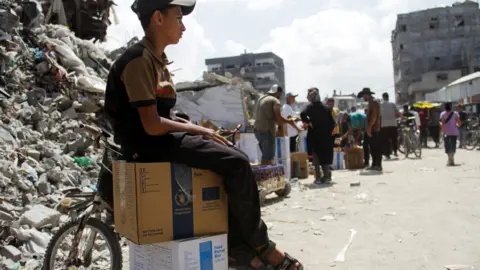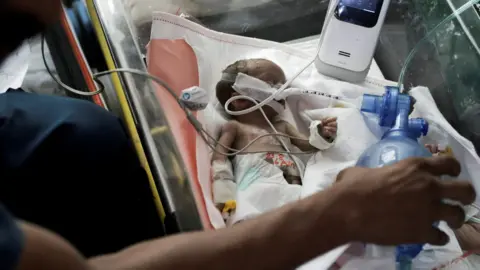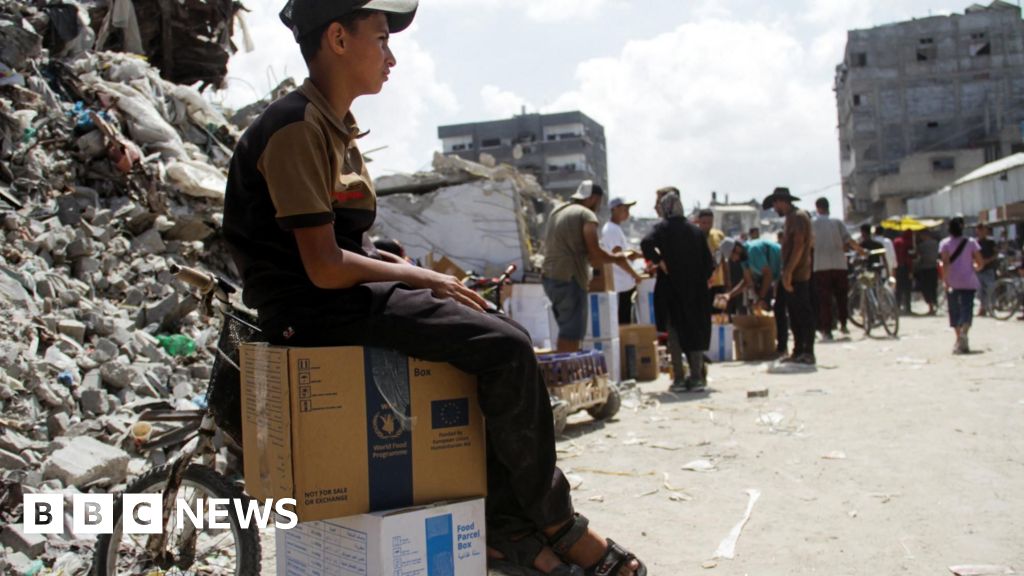 Reuters
ReutersThe United Nations said it had to temporarily suspend aid operations in the Gaza Strip as Israel issued a military withdrawal order in the heart of the Palestinian territory.
A senior U.N. official told reporters that its humanitarian staff were unable to carry out operations on Monday due to security concerns.
They said the evacuation order covered parts of the Israeli-designated humanitarian zone in and around the central town of Deir al-Balah, where the United Nations’ main operations center is located, forcing staff to move quickly and leaving equipment behind.
However, the official stressed that the UN agency would not leave Gaza and was currently working to find a safe place to operate.
The Israeli military said it issued evacuation orders to protect civilians during operations against Hamas and other armed groups.
Earlier on Monday, it said troops were continuing to “dismantle terrorist infrastructure” and “eliminate terrorists” in the suburbs of Deir al-Balah.
According to the United Nations, as many as 88.5% of the Gaza Strip has been under evacuation orders since the war between Israel and Hamas began.
This has forced an estimated 1.8 million people to seek shelter within the humanitarian zone, which is only about 41 square kilometers (15.8 square miles) in size and lacks critical infrastructure and basic services.
On October 7, an unprecedented attack occurred in southern Israel, killing about 1,200 people and taking 251 other people hostage. The Israeli military launched an operation to destroy Hamas in Gaza.
Since then, more than 40,430 people have been killed in Gaza, according to the Hamas-run Gaza Health Ministry.
Local officials in Deir al-Balah said that about 250,000 people have been forced to flee several neighborhoods in the town since the Israel Defense Forces (IDF) began issuing evacuation orders for the town on August 16.
Humanitarian staff and their families from various United Nations agencies, non-governmental organizations and service providers have also been displaced by the orders.
United Nations said A new order issued Sunday covers a neighborhood in the southern part of town Fifteen United Nations and NGO premises were affected, as well as 4 United Nations warehouses.
“Under current conditions, we are unable to deliver on our commitments today,” the senior U.N. official said on Monday. “As of this morning, we have not yet opened operations in Gaza.”
However, UN staff have been instructed to find solutions to resume operations.
“We are not leaving because the people there need us,” the official said. “We are trying to balance the needs of the population with the safety and security needs of United Nations personnel.”
Sam Ross, senior deputy director of the U.N. agency for Palestinian refugees in Deir el-Balah, warned that both U.N. staff and Palestinian civilians were “squeezed into smaller and smaller areas of Gaza.”
“The humanitarian zone declared by Israel has shrunk. It now accounts for about 11 percent of the entire Gaza Strip,” he told reporters via video link from New York. “This is not just 11 percent of the land that is habitable, serviceable, and life-friendly. These are sand dunes, these are crowded areas where people are packed together and trying to get by as best they can.
“It is in this context that polio has recently re-emerged in Gaza with a low number of cases. It could spread rapidly,” he added.
“Malnourished children. The health care industry is devastated. Water and sanitation are very poor. People are living in garbage, in sewage lakes. They are stressed, anxious, their immune systems are suppressed.
Mr Ross said UNRWA and other UN agencies had been concentrating on a polio vaccination campaign due to start this Saturday, which aims to vaccinate more than 640,000 children and prevent outbreaks.
“The vaccines have arrived. We call for calm and a humanitarian pause so that the vaccination program can be adopted and implemented successfully.”
 Reuters
ReutersMédecins Sans Frontières (MSF) also warned that the latest evacuation order from Deir al-Balah also affects areas near the town’s main medical facility, Al-Aqsa Hospital.
The medical charity said in a statement on Sunday that the explosion, which occurred about 250m (820 feet) from the hospital on Sunday, caused panic and many people subsequently chose to leave.
“As a result, MSF is considering whether to temporarily suspend wound care while trying to maintain life-saving treatment. According to the Ministry of Health, only 100 of approximately 650 patients remain in the hospital, seven of whom are in intensive care.
“This situation is unacceptable. Al-Aqsa Hospital has been overloaded for weeks due to a lack of other options for patients. All warring parties must respect the hospital and patients’ access to care.
Dr. Anas Ibrahim, an emergency physician at the hospital, told BBC Arabic’s Gaza Today program on Monday that the situation there was “indescribable.”
“As word of the evacuation spread, patients with broken bones and injuries began to evacuate the hospital because they feared they would be attacked,” he said.
“Everyone in the hospital is scared, scared and panicked. Everyone is scared now… everyone is waiting to see what’s going to happen.
The IDF said the evacuation order did not include nearby hospitals or medical facilities, and patients and medical staff did not need to leave.


